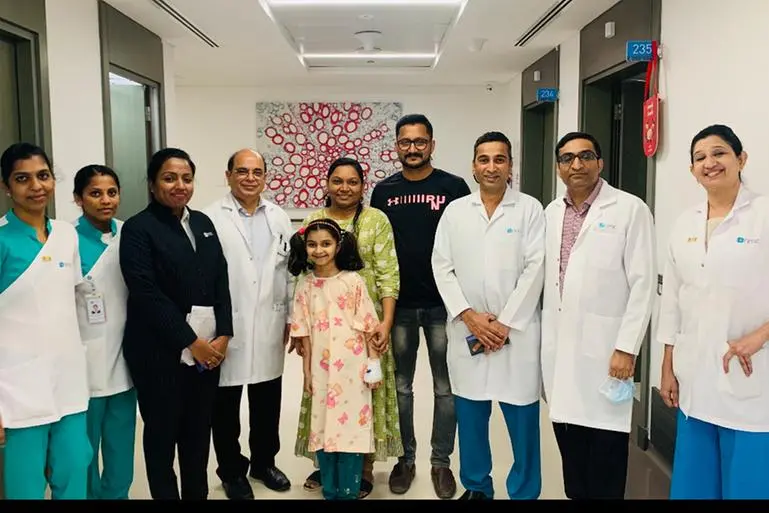PHOTO
Eight years old Jhanvijith Kelath, a 3rd grader at Sharjah Indian School and a resident of Sharjah, has had fever, vomiting, and abdominal pain for three days.
Her parents, father Sreejith Kelath, 40 years, Indian and marketing executive by profession and her mother, Deepthi Kelath, 36, Indian and a nurse by profession, took her to her paediatrician at one of Sharjah’s hospitals.
A visit to the local doctor
She underwent an initial diagnosis, ultrasound, and abdomen CT scan. Her paediatrician madea primary diagnosis of hepatomegaly - an enlarged liver bigger than usual, with mesenteric lymphadenitis.
She was referred immediately by her paediatrician to Dr Venkatesh M Annigeri, Consultant Paediatric Surgeon at NMC Royal Hospital, Dubai Investments Park in the afternoon of November 22, 2022.
What does the diagnosis mean?
Explaining the condition to Jhanvijith's parents, Dr Annigeri said, "Rather than a disease, an enlarged liver is a sign of an underlying problem while mesenteric lymphadenitis is a medical condition described as inflammation (swelling) of the lymph nodes in the abdomen (belly). Lymph nodes are organs that are part of our body's immune system. They filter harmful substances such as bacteria and viruses, so they don't spread to other parts of your body."
After an initial investigation, the team of doctors at NMC Royal Hospital, Dubai, diagnosed Jhanvijith with acute intestinal obstruction - a blockage in the small bowel with peritonitis which also implied a hole in the bowel with infection in the abdomen with sepsis. Dr Annigeri immediately planned for abdominal surgery owing to the critical condition. Accordingly, Jhanvijith was taken for surgery the next day, November 23.
During the surgery, Dr Annigeri found a rare clinical condition called isolated enteric duplication cyst of the small intestinal (twining of bowel) with gangrene (dead part of the bowel) and perforation of duplication cyst (hole in the cyst). After 2 hours of surgery, Dr Annigeri removed the dead gangrenous part of the intestine.
What is a Duplication Cyst
Dr Ananth Pai Kalsank, Medical Director & Specialist - General Surgery at NMC Royal Hospital, Dubai, explains, "Cysts are growths that can appear anywhere along the gastrointestinal tract or reproductive organs like the ovaries. Sometimes in the gastrointestinal tract, the cysts appear to duplicate (copy) the cells and structures of the organs they are attached to. For this reason, gastrointestinal cysts are often called duplication cysts. However, diagnosing a duplication cyst is difficult even with modern imaging techniques such as CT or magnetic resonance imaging, especially when no structural connection exists between the cyst and the normal bowel."
Explaining the reasons for their occurrence, Dr Ananth Pai added that the intestinal duplication cyst occurs when an abnormal development of intestinal tissue is attached to or adjacent to the intestines. It can occur anywhere from the oesophagus (the muscular tissue connecting the mouth to the stomach) to the rectum.
Dr Nilesh Kumar Panchal, HOD - Specialist Paediatrician at the hospital, said, "The exact cause of this abnormal development of the intestinal tissue is unknown. An isolated intestinal duplication cyst is an extremely rare congenital anomaly - meaning that it happens before your baby is born in the gastrointestinal tract. They are mostly detected in infancy and early childhood when symptoms such as abdominal pain and obstruction occur. Only a few cases have been reported/published in the English-language medical literature. Early surgical management will prevent further complications of this condition."
Deepthi Kelath, the child's mother, expressing her happiness over the timely diagnosis, treatment, and fast recovery of her daughter, said, "After a week, on the morning of November 30, Jhanvijith was doing well, free from symptoms, taking full oral diet with the surgical wound healing fast. I am happy at the outcome and shall remain grateful to my daughter's doctors and nurses at NMC."
Message for Parents
One must watch out for the danger signs like yellow colour vomiting and severe abdominal pain with abdominal distension (bloated stomach). In addition, a spell of fever with loss of appetite and absence of bowel movement must be an urgent trigger for the parents to consult a paediatrician.
Jhanvijith joined her school after one week of coming home and resumed participating in the school’s sporting events after a period of four weeks.
-Ends-
For media inquiries:
Anurag Kashyap
VP Marketing and Communications
NMC Healthcare
Anurag.Kashyap@nmc.ae




















